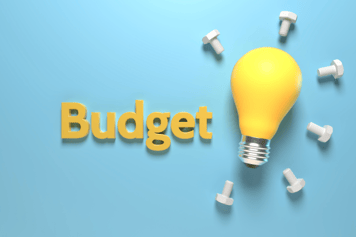With so many teen-focused money management apps popping up, often powered by AI, it’s worth asking:...
A Simple Guide to Simple Budgeting
Creating a budget might sound overwhelming, especially if you’re having a bit of anxiety around your finances, but it’s a simple way to help you take control of your financial life. In just a few steps, you can create a budget that’s easy to follow and helps you meet your goals. Here are some things to keep in mind as you get started:
1. Understand Your Income
The first step is to know how much money you have coming in. This includes your salary, any freelance income, or other sources of regular income. If your income varies, try to get an average by looking at the past few months. Knowing your exact income is the foundation of your budget.
2. Track Your Spending
Before creating a budget, track your spending for a month. Write down every expense, no matter how small. This includes bills, groceries, eating out, and even that daily coffee. There are plenty of apps that can help with this, but a simple notebook or your phone’s Notes app works just as well.
3. Categorize Your Expenses
Once you have a month's worth of expenses, categorize them. Common categories include:
- Housing: Rent or mortgage, utilities, maintenance
- Transportation: Gas, public transit, car payments, insurance
- Food: Groceries, dining out
- Entertainment: Movies, hobbies, subscriptions
- Health: Medical bills, insurance, fitness
- Personal: Clothing, personal care products
4. Set Goals
What do you want your budget to achieve? Maybe you want to save for a vacation, pay off debt, or build an emergency fund. Setting clear, achievable goals gives you something to work towards and can motivate you to stick to your budget.
5. Create a Budget Plan
Now that you know your income, spending habits, and goals, you can create a budget plan. List your categories and assign a spending limit to each one. Ensure your total expenses don’t exceed your income.
This part of the process may require you to cut some expenses if needed, but make sure to prioritize–and not take out all the fun stuff! It’s important to be realistic and fair when planning your budget. Is buying a coffee every morning on the way to work a favorite part of your day? Budget for it! That just may mean you need to eat out one less day of the week, or skip the shopping spree. It’s all about balance.
Set yourself up for success so you maintain it!
6. Use Tools
There are many tools available to help you stick to your budget and reach your financial goals. An app like Plinqit is a great place to start putting money away and save for an event or even just a rainy day.
7. Review Regularly
Your budget isn’t set in stone. Life changes, and so will your financial situation. Review your budget monthly to see where you stand. If you’re consistently overspending in one category, adjust your budget or find ways to cut back. Like we said above, it’s important to make a budget that is sustainable and realistic!
8. Save First
Pay yourself first by setting aside money for savings as soon as you get paid. This ensures that saving is a priority, not an afterthought. Automate transfers to your savings account if possible, so you’re not tempted to spend the money. (If automating your savings transfers sounds like something you want to be doing, check out the Plinqit app!)
9. Be Flexible
Unexpected expenses will come up. Build some flexibility into your budget to accommodate these. This might mean having a small buffer or an “unexpected” category for those surprise costs.
10. Celebrate Small Wins
Budgeting isn’t just about restrictions; it’s about making your money work for you. Celebrate your progress, whether it’s paying off a credit card, saving a certain amount, or simply sticking to your budget for a month. Reward yourself with something small and affordable that makes you happy. Celebrate those wins–you deserve it!
11. Stay Motivated
Staying motivated can be challenging, especially for those marathon goals that take a while to achieve. Remember why you started budgeting in the first place. If you stumble, don’t get discouraged. Everyone makes mistakes. Learn from them and keep moving forward! It’s important to stay positive, even if you slip up.
Don’t take your eyes off the prize!
Budgeting is a powerful tool that can help you gain control over your finances and reduce stress. By understanding your income and expenses, setting clear goals, and regularly reviewing your plan, you can build a budget that works for you. Trust us, your future self will appreciate it!
Posted by

Mollie Macklin is a content contributor for The Plinq. Mollie believes knowledge is power and enjoys creating valuable content for young adults navigating big financial decisions to help them create the lifestyle that makes them happy. Mollie also enjoys funny movies, traveling with her boyfriend, playing her Nintendo Switch, and hanging out with her cats in her free time.




